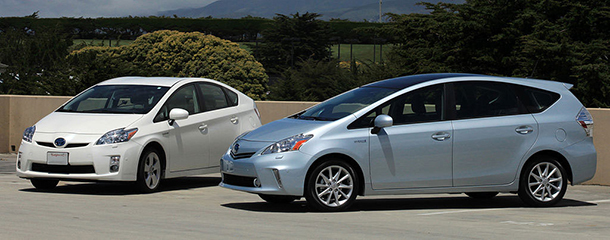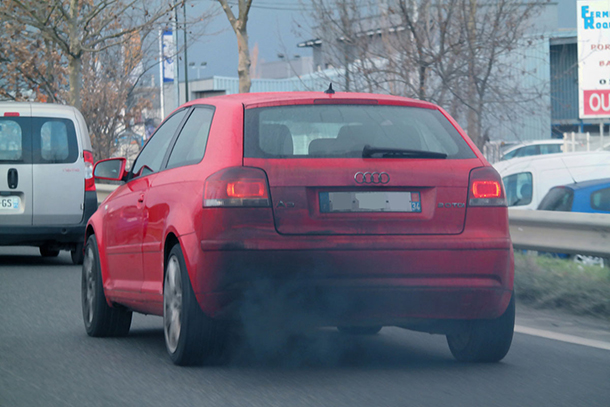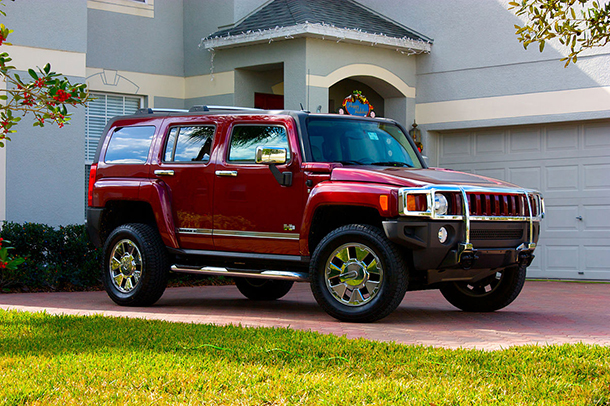Auto Makers Move to Stall Efficiency
Air Date: Week of March 3, 2017

Toyota’s Prius hatchback hybrid-electric cars also have a streamlined shape for improved fuel efficiency. (Photo: Mario Roberto Duran Ortiz, Wikimedia Commons CC BY-SA 3.0)
President Obama’s EPA worked closely with industry to create a fuel economy standard of about 54 mpg starting in 2025. Now the auto industry lobby has asked EPA Administrator Scott Pruitt to consider rolling them back. Dan Becker of the Safe Climate Campaign explains to host Steve Curwood that the ambitious mileage requirements are key for U.S. goals under the Paris climate Agreement, and weakening them would cost American consumers while boosting short term industry profits.
Transcript
CURWOOD: From PRI, and the Jennifer and Ted Stanley Studios at the University of Massachusetts Boston, this is Living on Earth. I’m Steve Curwood. Shortly after Scott Pruitt was sworn in as the new EPA Administrator, the Alliance of Automobile Manufacturers sent him a letter requesting that the agency re-examine the 2025 fuel economy standards. At the end of the Obama Administration these rules were made final. The petition alleges the rules would lead to extreme layoffs and added expenses in the domestic auto industry. We asked the Alliance for an interview, but they declined. So for some insight we turned to Dan Becker, director and founder of the Safe Climate Campaign.
Dan, welcome back to Living on Earth.
BECKER: Thanks a lot, Steve. It's great to be here.
CURWOOD: Now, we're talking with you today about the fuel economy standards that President Barack Obama wrapped up in the last days of his term, and how the industry is now fighting back against those. First, please remind us what are those standards?
BECKER: These are standards that the auto industry and environmentalists and the Obama administration negotiated for two years about. We all agreed that these were reasonable standards at the time. The auto companies signed letters of commitment saying that they wouldn't challenge the standards except during a midterm review, and what they require is that the average vehicle in 2025 get over 50 miles to the gallon. These are achieved by putting better technology on vehicles. It's auto mechanics, not rocket science - better engines, better transmissions, better aerodynamics, improved tires - and the auto companies have frankly been complying up until now, but they don't want to comply now that Mr. Trump is president and they think they can get a way out. So, they've petitioned the Trump administration to join them in trying to roll back these standards. They're being somewhat duplicitous in that they don't say how much they want them rolled back. They just say that they want the procedure undone that finalized the standards, and then they'll go from there.
CURWOOD: And we should note that we contacted the Alliance for Automobile Manufacturers to ask them to come on the program, and they declined. They said the letter simply speaks for itself that they had put out. But the letter, as you say, offers no details.
BECKER: The auto companies depend upon selling vehicles to the public and they know that a lot of the people who buy their vehicles care about their planet, care about the environment, care about their children's health, so they don't want to say that they're trying to run these standards off the road. They just want to do it quietly, so the letter that they sent to the Trump administration says, “We want changes in the procedure”, but this polite procedural request actually hides a demand to weaken the standards.
CURWOOD: So, in effect, they've asked the new EPA head Scott Pruitt to withdraw the standards claiming they have these procedural and substantive defects. How do you respond to those claims?

Tailpipe emissions from passenger cars are a major source of greenhouse gas emissions and pollutants harmful to human health. (Photo: Pittou2, Flickr CC BY-NC 2.0)
BECKER: The process that they're objecting to is a side agreement to the main agreement that they signed in 2012. The auto companies insisted on a reopener provision, a midterm review to reevaluate whether the standards were properly set in 2012. The government just finished that reevaluation. They spent $30 million over a couple years taking apart vehicles, looking at each component of the engines, of the transmissions, trying to figure out what would it cost the auto companies to make these vehicles more efficient. In the evaluation, they concluded that there was ample technology to meet the standards, that the technology worked, it was cost-effective -- In fact, more cost-effective than the administration had estimated in 2012 when they promulgated the standards -- and the industry had in fact become extremely profitable and was very successful selling these vehicles. The industry can meet these standards without making any electric cars and only a small number of hybrids, as long as they incorporate better technology on their conventional vehicles, and they've begun to do that. They need to continue.
CURWOOD: But what about the auto industry's claim that complying with the fuel economy standards would cause the loss of more than 1 million American jobs?
BECKER: It's sort of interesting. They say that there would be more than a million jobs lost, but their letter also indicates that that's more people that work at Ford, GM and Chrysler assembling vehicles. So they're not telling the truth. The auto industry has put 700,000 people to work since these standards started being implemented. That's because these standards require more technology, more time from workers assembling them, but the cost of that is incorporated into the vehicle, the consumer buys it, and they save money in turn because they're paying less for gas, and the savings of the gas pump more than make up for the better technology that they're buying.
CURWOOD: Tell me, how much carbon dioxide would the fuel economy standards potentially keep out of the atmosphere, and how important would these be to the US commitment on the Paris Agreement?
BECKER: If the Obama standards are implemented, they will save 12 billion barrels of oil, eliminate six billion metric tons of carbon dioxide pollution, and save consumers over a $1 trillion at the gas pump over the life of the program. That's a lot. That's the biggest single step any nation has ever taken on cutting global warming pollution. The Trump administration has already expressed hostility to the Clean Power Plan, the power plan rules that President Obama had developed. That was roughly half of what it would take to meet the Paris goals. The car standards would be a little less than another half, and so together that would devastate Paris agreement, but more importantly would mean six billion tons more carbon dioxide pollution in the atmosphere than without these rules. That's just the car rules.
CURWOOD: Now, where does California fit in here? It's had tighter emission standards than the rest of the country, but to what extent will it still be allowed to lead?

A September 1973 photo shows downtown Los Angeles darkened by heavy smog. Owing to California’s susceptibility to smog, the state is allowed to set stricter vehicle emissions rules than the federal government. (Photo: Gene Daniels / Environmental Protection Agency, CC government work)
BECKER: That's a very important question. When the Clean Air Act was first passed around 1970, California said, look, we've got much worse air pollution than other parts of the country, and we already have tighter rules in California that you're considering putting on the books for the country. It doesn't make sense for us to go backward, and so they were given a special provision that says they can have tougher air pollution emissions rules than the rest of the country, as long as EPA signs off on it. And they said, if auto companies as part of this negotiation agree to follow the federal rules set 2012 -- the 50-plus mile per gallon standards -- we will deem that to be compliant with California's tougher law. And there are about a dozen states that follow the California rules, all together it's about 40 percent of the car-buying public, and they will be able to enforce the California rules as well.
CURWOOD: The EPA has to agree for California to have its own rules. What if the Trump administration and its new EPA administrator, Mr. Pruitt, says, "No, no, no, no, California, you don't have that deal anymore".
BECKER: Well, it's pretty clear that California's waiver, the permission from EPA, is a one-time deal. Once, it's been granted, it cannot be revoked. So, California has the right to enforce the existing rules. They probably couldn't get the Trump administration to agree to tighter rules, but for the four years that Trump is going to be president, California will be able to implement the existing rules and so will the other states that follow California's lead.
CURWOOD: So, Dan, as I recall the last time you were on our program, I think it was 2010, you shared an elegy to the king of all gas guzzling vehicles, the Hummer. Just briefly, can you remind me why the Hummer has gone the way of the Dodo bird?
BECKER: The Hummer was an example of auto industry excess. It was too large, too polluting, too gas-guzzling, and even General Motors decided it needed to go the way of the dinosaur, whose fuels it was burning. And that's where the industry is making another mistake now. In 2008, the industry had become much too dependent upon gas guzzling polluting vehicles, and when gas prices shot up in 2007 and 2008, the industry was caught with its tailpipe down, and it was unable to make enough vehicles that consumers wanted to buy and was stuck with a lot of gas-guzzling SUVs and pickup trucks that consumers didn't want to buy. And so, two of companies, GM and Chrysler, went bankrupt, Ford hocked itself up to its blue oval for $24 billion, and the federal government came in with a bailout that saved the industry with $85 billion of taxpayer money, most of which was never paid back.

The Hummer H3, which had an average fuel economy of 15 mpg, was discontinued in 2010. (Photo: Marcus Quigmire, Wikimedia Commons CC BY-SA 2.0)
CURWOOD: And these days gas prices have dipped way down. What's that done for the auto industry? It seems that you go by their lots and the simple sedans are just backed up and not moving and the trucks are flying off the lots, aren't they?
BECKER: Well, that's true. The auto companies like to blame the consumer. They like to say, hey, we're just doing what the consumers want. They want gas-guzzling pickup trucks that are bigger than your garage, so we have to make them. The reality is that they make a lot of money on pickup trucks. They make a lot of money on SUVs because they're using antiquated technology that doesn't cost very much compared to more advanced car technology. They can offer a premium price, and Americans seem to want to buy them. Definitely the auto companies are taking advantage of the fact that gas prices are currently low. They're spending billions of dollars on ads to say it's cool to buy this big truck and be “Ford-tough.”
CURWOOD: And of course we have this law on the books that allows people to write off, I think, the first $25,000 of any vehicle that they're really...a big one that they're putting in to use for business, like a big pickup truck or big SUV...is really supporting the sale of those vehicles, as I understand it.
BECKER: It's an outrageous provision. Years ago, I actually wrote to the head of the IRS and asked that they investigate whether the people who were availing themselves of this loophole were actually using the vehicles in business, which the IRS assumed that they were, and I got a polite letter back saying, “Mind your own business. This is mine.” You and I and everyone listening to this show is subsidizing 6,000 pound-and-above, giant SUVs and gas-guzzling vehicles for people who allege that they're using them in their dentistry business or other activity, even if they're not.
CURWOOD: People really do seem to like these SUVs. You say there is a lot of heavy advertising to get people to like them, but what we know about consumer choices?

Dan Becker is the founder and director of the Safe Climate Campaign, based in Washington, D.C. (Photo: Dan Becker)
BECKER: Many consumers have been choosing to buy a vehicle that is more polluting, more gas-guzzling than the vehicle that they actually need. In some cases they see that a neighbor has one, and so they want to get what the neighbor got, but if you're not on a farm or you're not hauling material...If all you're doing is hauling a latte home from Starbucks, you don't really need an SUV.
CURWOOD: But, Dan, yeah, you may not need it, but you might want it. Isn't America all about choice? They're going to say, after all, “It's not just your car, but it's your freedom”, I think was one advertising line.
BECKER: We're not talking about restricting people's choices. We're saying that the auto companies need to add better technology to vehicles to make them go further on a gallon of gas, whether it's a hybrid or a Hummer. All I urge is that the industry be more responsible in making vehicles with better technology, so that when people buy whenever they buy, it pollutes a lot less.
CURWOOD: Dan, I want to thank you for taking the time with me today. Dan Becker is the Director and Founder of the Safe Climate Campaign.
BECKER: Thanks very much for having me on. It's been a pleasure.
Links
The EPA’s Final Determination on the 2025 Vehicle GHG Emissions Standards
The Alliance of Automobile Manufacturers letter to Administrator Pruitt
NYTimes: “Automakers Call on E.P.A. Chief to Ease Fuel-Efficiency Standards”
EPA: Vehicle Emissions California Waivers and Authorizations
Historical background of the California emissions standards waiver
Living on Earth wants to hear from you!
Living on Earth
62 Calef Highway, Suite 212
Lee, NH 03861
Telephone: 617-287-4121
E-mail: comments@loe.org
Newsletter [Click here]
Donate to Living on Earth!
Living on Earth is an independent media program and relies entirely on contributions from listeners and institutions supporting public service. Please donate now to preserve an independent environmental voice.
NewsletterLiving on Earth offers a weekly delivery of the show's rundown to your mailbox. Sign up for our newsletter today!
 Sailors For The Sea: Be the change you want to sea.
Sailors For The Sea: Be the change you want to sea.
 The Grantham Foundation for the Protection of the Environment: Committed to protecting and improving the health of the global environment.
The Grantham Foundation for the Protection of the Environment: Committed to protecting and improving the health of the global environment.
 Contribute to Living on Earth and receive, as our gift to you, an archival print of one of Mark Seth Lender's extraordinary wildlife photographs. Follow the link to see Mark's current collection of photographs.
Contribute to Living on Earth and receive, as our gift to you, an archival print of one of Mark Seth Lender's extraordinary wildlife photographs. Follow the link to see Mark's current collection of photographs.
 Buy a signed copy of Mark Seth Lender's book Smeagull the Seagull & support Living on Earth
Buy a signed copy of Mark Seth Lender's book Smeagull the Seagull & support Living on Earth

